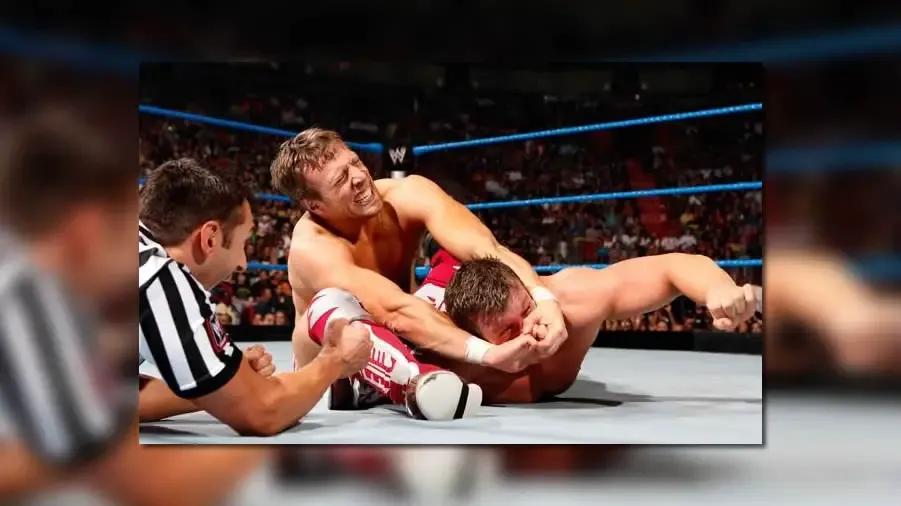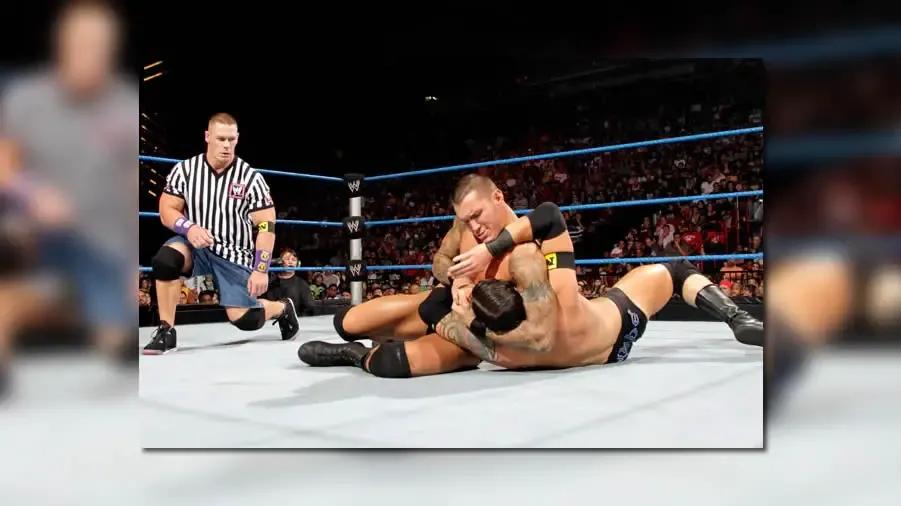10 Things We Learned From WWE Survivor Series 2010
Almost the last Survivor Series ever... and John Cena was FIRED too!

Nov 15, 2018
Superhero characters being faced with moral dilemmas can make for good television, especially a heroic figure that had been presented as bulletproof for a lengthy stretch. John Cena was a part of the Nexus against his will, and would guest officiate leader Wade Barrett's WWE Championship shot against titleholder Randy Orton. If Barrett won, Cena would be free from lackey-dom. If Orton won, Cena would be fired from WWE. Would Cena succumb to temptation, committing an underhanded act just to save his own job?
That was about the only part of Survivor Series 2010 that didn't feel so paint by numbers, as once more in this era, we're given a show that isn't what one would call hideous or awful, but isn't exactly something we'd be counting down toward with agonized impatience. And the show played out as such, with action that was mostly agreeable, but nothing earth-shattering until the main event rolled around.
And as you probably know, Cena chose morality and fair play. It cost him his job, which could've led to an interesting new direction had he not remained in the picture as trucker hat-wearing version of Poochie. If anything, WWE's utter dependence on Cena was spelled out explicitly after Survivor Series, and it was rather disconcerting.

Whether you loved or hated Survivor Series 2010, just be happy that we even got the show at all. In February 2010, months after the 2009 event did absolutely dismal numbers for both ticket sales and PPV buys, Vince McMahon announced during an investors conference call that Survivor Series was finished. He called the event "obsolete" and said the November PPV would be rebranded.
This led to an immediate backlash, as fans of the event and its history made their voices heard. About four months after McMahon's announcement, WWE quietly reinstated the show, as tickets went on sale for that year's Survivor Series. Even if the shine of the event has worn down over the years, it's still part of WWE lore, and thankfully remains with us to this day.

The 2010 Survivor Series emanated from the American Airlines Arena in Miami, the same building that Survivor Series took place in just three years earlier. That show drew 12,500 fans to a venue that seats a shade under 20,000 for Heat games, though to be fair, WWE events seat less fans than basketball games due to the stage set-up. How did the 2010 show compare to its 2007 counterpart?
To put it mildly: not well. The 2010 Survivor Series managed only 8000 fans, a 36 per cent drop from just three years earlier. It was a rather sad state of affairs that one of WWE's Big Four (even the one that was on the chopping block due to a decline in prestige) to see such a tumble.

What if I were to tell that before the show, a former WCW Champion (that wasn't under WWE contract) jumped the guardrail and caused a minor scene? Was this the beginning of Invasion: Mark II? Hardly - it was David Arquette, the former Mr. Courtney Cox, that would receive a brief pre-show acknowledgement for the in-house fans, prior to jumping the rail and climbing on top of the announce table.
Arquette was then dragged away by security, and not seen for the rest of the night. It's not clear if this was a little "bonus" for the fans, or a case of the actor making himself part of the show without prior authorization. Arquette was reportedly in the midst of a rowdy weekend in Miami, as noted by several news outlets, shortly after he and Cox had separated, so perhaps his judgment was heavily fogged.

The opening match at Survivor Series would feature a fairly brisk United States title match, with fresh-faced champion Daniel Bryan felling Ted DiBiase in about 10 minutes. Bryan was coming along nicely as a humble fan favorite, one with an endless supply of technical maneuvers and holds at his disposal. Sadly, Bryan competing in one-on-one pay-per-view matches would be a rare commodity.
The next time that Bryan wrestled in a one-on-one pay-per-view match wouldn't come until SummerSlam 2011, nine months later. Between those events, Bryan only wrestled on two PPV main cards - in the 2011 Royal Rumble match, and at that summer's Money in the Bank, where he'd win the blue briefcase. Otherwise, Bryan was either stuck on the pre-show, or scratched from the card totally.

Eight years later, the phrase "Low Ki once competed for the Intercontinental title at Survivor Series" seems totally far-fetched and impossible, but it actually did happen. Low Ki, renamed Kaval at the time, was the winner of the second season of the reality TV version of NXT, and was basically treated as an afterthought upon his victory. Guess the fan sentiment in him didn't mean much.
The match at Survivor Series with champion Dolph Ziggler would be Low Ki's only WWE PPV match. The following month, after losing more matches, and being told that creative wasn't going to have anything for him, he received his release from the company. Hopefully, he never forgot the knowledge imparted on him by mentors Michelle McCool and Layla.

The 2010 Survivor Series fulfilled the minimum requirements of any event bearing the name, giving us one token elimination match so that people like me would shut the hell up. The first elimination of said match saw MVP go down, pinned at the hands of fellow future TNA alumnus Drew McIntyre.
The match would mark MVP's final PPV with the company, as less than two weeks later, he would officially ask for his release. MVP was unhappy with his role at the time, and said he was being pressured to sign an extension. Wanting to give Japan a try, MVP sought his exit and filmed his final match alongside partner, and soon to be fellow departee, Kaval. Their opponents? Of all duos, Drew McIntyre and Dolph Ziggler.

Matt Striker can be a polarizing announcer. Critics find him to be overblown and over-explanatory, while fans of his defend the energy and knowledge as a nice alternative to lifeless commentary. Reportedly, Striker didn't get on well with PPV colleagues Michael Cole and Jerry Lawler, and there existed some palpable tension whenever the three shared the booth.
Dave Meltzer would report that on this night, probably during a backstage segment or advert break, Cole removed his own headset and began openly admonishing Striker for going overboard with his commentary. Whether this was Cole acting alone, or done at the behest of someone like Vince or Kevin Dunn, isn't clear. Whatever Cole said to try and right the Striker ship, it didn't keep the former teacher from erroneously misidentifying the consequence of the main event, a gaffe ripe for Botchamania.

That Striker call would go down in infamy as a royal blunder. When Cena "did the right thing" by counting Barrett's shoulders down, he willingly lost his own job as opposed to saving it at the expense of a man's title reign. When Cena made that fate-sealing count, Striker gleefully screamed, "CENA'S FREE!" before Cole bitterly breathed "Cena's *fired*" with emphasis.
Perhaps that moment didn't have to come to pass had the announcers been clued in to the finish. Reportedly, all three men at the table were not told the ending of the match, so that their reaction to the moment would be much more genuine. If Cena were fired, the "oh no" in their tone might come off as heartfelt. Sadly, Striker...well, you know what Striker did.

Of course, Cena didn't just go away after his firing - he remained a fixture of weekly Raw programs because you know how much ratings would've suffered if the hero to millions of children were absent long-term. Admittedly, it was a risk WWE couldn't exactly afford to take, which begs the question of why they ran a termination stip in the first place.
Cena was also wrestling within a week of his written firing - albeit under a mask. Beginning on the Sunday after Survivor Series, Cena wrestled the first of four house show matches under a mask as "Juan Cena", the lucha-fied version of WWE's Big Match John. Like ratings, WWE wasn't about to let house show attendance take another wrecking ball strike without the cash cow involved.

Well, the good news is that the buyrate went up. It didn't go up by *much*, but the 2010 Survivor Series pulled in 244,000 buys, topping the previous year's abysmal number by 19,000. It's still pretty bad when compared to other recent Survivor Series, but at least it was a slight improvement. Still, Survivor Series ended up getting dwarfed by its weekend competition.
The surging Ultimate Fighting Championship pulled in 500,000 buys one night earlier for their UFC 123 pay-per-view, headlined by Quinton "Rampage" Jackson (who actually appeared on Raw earlier that year, promoting The A-Team movie) edging out Lyoto "The Dragon" Machida via split decision, before 16,400 fans in Auburn Hills, MI. Not only did UFC more than double the buyrate of Survivor Series 2010, but it more than doubled the attendance as well.